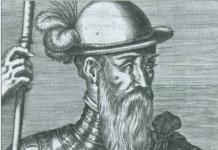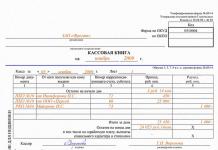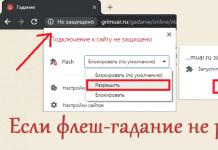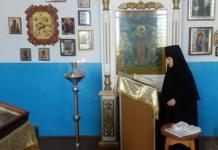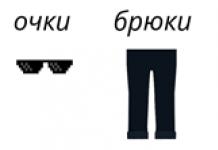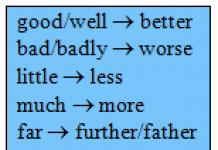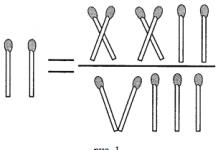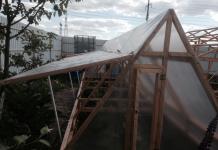Методичка
Методичка - I ж. разг. Преподавательница методики. II ж. разг. Методическое пособие. Толковый словарь Ефремовой. Т. Ф. Ефремова. 2000 … Современный толковый словарь русского языка Ефремовой
методичка - метод ичка, и, род. п. мн. ч. чек … Русский орфографический словарь
методичка - и; ж. Разг. Методическое пособие. Составлять методичку. Работать по методичке … Энциклопедический словарь
методичка - и; ж.; разг. Методическое пособие. Составлять методичку. Работать по методичке … Словарь многих выражений
методичка - МЕТОДИЧКА, и, мн род. чек, дат. чкам. Разг. Методическое пособие: средство обучения какому л. предмету (обычно в высшем учебном заведении) небольшая книжка, в которой содержатся минимальные сведения, помогающие студенту в освоении какого л. курса … Толковый словарь русских существительных
Перекристаллизация - Перекристаллизация метод очистки вещества, основанный на различии растворимости вещества в растворителе при различных температурах (обычно интервал температур от комнатной до температуры кипения растворителя, если растворитель … Википедия
Центральный архив Министерства обороны Российской Федерации - ЦА Минобороны России, ЦА МО РФ … Википедия
ЦАМО - Центральный архив Министерства обороны Российской Федерации (ЦАМО РФ) ведомственный архив Российской Федерации, в котором хранятся документы различных штабов и управлений, объединений и соединений, частей, учреждений и военно учебных заведений… … Википедия
Натриевая соль пропилового эфира пара-оксибензойной кислоты - Химичес … Википедия
Яшин, Илья - Член президиума движения Солидарность Член РПР ПАРНАС, член президиума движения Солидарность, бывший сопредседатель общероссийского Молодежного Яблока, бывший член бюро Московского регионального отделения РДП Яблоко (исключен из партии в… … Энциклопедия ньюсмейкеров
Книги
- Методичка. Биоэнергетическая очистка жилых и нежилых помещений , Яков Быль , Надеюсь, что эта методичка поможет вам обрести в себе уверенность, изменит окружающий вас мир, и ваше я станет высшим Я, которое будет написано с большой буквы.… Категория: Здоровье Издатель: Издательские решения , Купить за 480 руб электронная книга
- Методичка для должников. Я должник в исполнительном производстве. Что делать? , Алексей Шарон , В пособии рассматриваются вопросы, связанные с особенностями взыскания долга в рамках исполнительного производства с позиций должника. Главная цель – помочь должнику разобраться со своими… Категория: Юриспруденция, право Издатель: Издательские решения , Купить за 120 руб электронная книга (fb2, fb3, epub, mobi, pdf, html, pdb, lit, doc, rtf, txt)
УФИМСКИЙ ГОСУДАРСТВЕННЫ НЕФТЯНОЙ
ТЕХНИЧЕСКИЙ УНИВЕРСИТЕТ
Кафедра иностранных языков
УЧЕБНО-МЕТОДИЧЕСКОЕ ПОСОБИЕ
ПО АНГЛИЙСКОМУ ЯЗЫКУ
ДЛЯ СТУДЕНТОВ
ЗАОЧНОГО ОТДЕЛЕНИЯ
Данное учебно-методическое пособие предназначено для студентов 1 и 2 курсов заочного отделения всех специальностей.
Цель учебно-методического пособия - формирование умения и навыков изучающего и информативного чтения литературы на английском языке по специальности широкого профиля с тем , чтобы извлекать из нее необходимую информацию.
Учебно-методическое пособие включает следующие разделы: программу, структуру курса обучения иностранному языку, требования на зачетах и экзамене, список рекомендуемой литературы, методические указания по выполнению контрольных работ и 6 контрольных работ, рассчитанных на выполнение в течение I-IV семестров. Каждая контрольная работа дана в 4 вариантах.
В качестве материала использованы лексико-грамматические упражнения, составленные в соответствии с требованиями программы и учебных планов, а также тексты научно-популярного, общетехнического и страноведческого характера.
Составители: Барановская М. Е., ст. преподаватель
Курочкина Т.А., ст. преподаватель
Сыртланова P.P., ст. преподаватель
© Уфимский государственный нефтяной технический университет, 2000 ПРЕДИСЛОВИЕ
Данные методические указания и контрольные работы составлены в полном соответствии с программой курса «Иностранные языки« и рабочими учебными планами специальностей и предназначены для студентов заочного отделения Уфимского государственного нефтяного технического университета. В результате изучения курса студент должен овладеть навыками, необходимыми для практического владения языком: чтение и понимание текстов по широкому профилю вуза и владение устной речью в рамках пройденных устных тем.
ПРОГРАММА
Основной целью обучения студентов английскому языку в неязыковом вузе является достижение ими практического владения этим языком, что предполагает при заочном обучении формирование умения самостоятельно читать литературу по широкому профилю вуза с целью извлечения информации из иноязычных источников и владеть устной речью (говорение и аудирование) в рамках пройденной тематики.
В процессе достижения цели обучения решаются воспитательные и общеобразовательные задачи, способствующие повышению общеобразовательного и культурного уровня студентов.
Данная программа предусматривает, главным образом, самостоятельную работу студентов. Работа под руководством преподавателя рассчитана на 40 учебных часов или 52 учебных часа (в зависимости от специальности), которые используются для групповых занятий различного характера (установочные, контрольно-закрепительные и другие).
СТРУКТУРА КУРСА
В соответствии с действующими учебными планами на полный курс обучения иностранному языку для заочных отделений вузов неязыковых специальностей отводится не менее 40 (52) часов обязательных аудиторных занятий , 240 часов самостоятельной работы. За весь курс обучения студент выполняет 6 контрольных работ, сдает 3 зачета и экзамен.
Распределение учебных часов. I курс: 20 часов (24 часа) аудиторных занятий, 120 часов самостоятельной работы. Студент выполняет 3 контрольные работы и сдает 2 зачета.
II курс: 20 часов (28 часов) аудиторных занятий, 120 часов самостоятельной работы. Студент выполняет 3 контрольные работы и сдает зачет и экзамен.
ТРЕБОВАНИЯ НА ЗАЧЕТАХ И ЭКЗАМЕНЕ
Зачет. Зачет получают студенты, выполнившие контрольные работы, сдавшие тексты в объеме, предусмотренном программой, т.е. тексты учебника или учебных пособий по английскому языку (по профилю вуза) и устные темы.
Экзамен. К экзамену по английскому языку допускаются студенты, имеющие зачеты за три семестра, выполнившие письменные контрольные работы и сдавшие учебный материал по чтению за второй курс.
На экзамене по английскому языку проверяются умения:
Форма проверки - письменный или устный перевод.
Норма перевода - 1000 печатных знаков в час письменно или 1200-1500
и 5-8 незнакомых слов на 600-800 печатных знаков.
Форма проверки понимания - передача содержания прочитанного на русском
Время подготовки - 8-10 минут;
в) делать устное сообщение и беседовать по одной из пройденных тем.
ЛИТЕРАТУРА
Андрианова Л.Н., Багрова Н.Ю., Ершова Э.В. Учебник английского языка для
заочных технических вузов и факультетов. - М., 1988.
Баг Э.Я., Нечаева Э.С., Яралова Э.С. Учебник английского языка для вечерних вузов. - М., 1962.
Березовская Т.Ф., Кожевникова А.И. Учебное пособие по английскому языку. Ч. 1 и 2. - Уфа. 1993.
Бурова З.И. Английский язык для гуманитарных специальностей вузов. - М., 1987.
Гундризер В.Р., Ланда А.С. Учебник английского языка. - М., 1972.
Курашвили Е.И., Михалкова Е.С. Английский язык для технических вузов. Начальный курс - М., 1991.
Людвигова Е.В., Баженова С.М., Павлова Э.С., Седов Д.Г. Учебник английского языка для вузов заочного обучения. - М., 1968.
Новицкая Т.М., Кучин Н.Д., Кускова Л.А., Разговорова Е.Н. Учебник английского языка для заочных технических вузов. - М., 1974.
Новицкая Т.М., Плюске Е.А., Кучин Н.Д. Учебник английского языка для заочных вузов, - Л., 1961.
Новицкая Т.М., Кучин Н.Д. Практическая грамматика английского языка. - М., 1979.
Петрова А.В., Понтович С.В. Учебник английского языка для заочных вузов. - М., 1961.
Петрова А.В. Самоучитель английского языка. - Харьков, 1996.
Пронина Р.Ф., Сорокина Л.Н. Учебник английского языка для заочных и вечерних вузов. - М., 1968.
Березовская Т.Ф., Кожевникова А.И., Мельникова В.А., Сыртланова P.P. Методические указания по коррективному курсу фонетики. - Уфа, 1994.
МЕТОДИЧЕСКИЕ УКАЗАНИЯ
Настоящие методические указания имеют целью помочь Вам в Вашей самостоятельной работе над развитием практических навыков чтения и перевода литературы по специальности на английском языке.
Для того, чтобы добиться успеха, необходимо приступить к работе над языком с первых же дней занятий в вузе и заниматься языком систематически.
Особенностью изучения иностранного языка в заочной системе обучения является то, что большая часть языкового материала должна прорабатываться самостоятельно.
1. ПРАВИЛА ЧТЕНИЯ
Прежде всего, необходимо научиться правильно, произносить и читать слова и предложения. Чтобы научиться правильно произносить звуки и правильно читать тексты на английском языке, следует: во-первых, усвоить правила произношения отдельных букв и буквосочетаний, а также правила ударения в слове и в целом предложении; при этом особое внимание следует обратить на произношение тех звуков, которые не имеют аналогов в русском языке; во-вторых, регулярно упражняться в чтении и произношении по соответствующим разделам рекомендованных программой учебников и учебных пособий. Систематическое прослушивание звукозаписей помогает приобрести навыки правильного произношения.
При чтении необходимо научиться делить предложения на смысловые отрезки - синтагмы, что обеспечит правильную технику чтения, необходимую для правильного понимания текста.
2. ЗАПАС СЛОВ И ВЫРАЖЕНИЙ
Чтобы понимать читаемую литературу, необходимо овладеть определенным запасом слов и выражений. Для этого рекомендуется регулярно читать на английском языке учебные тексты , газеты и оригинальную литературу по специальности.
Работу над закреплением и обогащением лексического запаса рекомендуем проводить следующим образом:
а) работая со словарем, выучите английский алфавит, а также ознакомьтесь по предисловию с построением словаря и с системой условных обозначений, принятых в данном словаре;
б) слова выписывайте в тетрадь в исходной форме с соответствующей грамматической характеристикой, т.е. существительные - в единственном числе, глаголы - в неопределенной форме (в инфинитиве), указывая для неправильных глаголов основные формы.
При переводе с английского языка на русский необходимо помнить, что трудности вызывает следующее:
1)
Многозначность слов. Например, слово right может выступать в
роли существительного «право», а также и в качестве прилагательного «прямой, правый». Подобрать нужное значение слова можно только исходя из контекста, т.е. окружающих данное слово слов.
e.g. Our working people have the right to work and study.
A right angle equals 90 degrees. Go to the right.
2)
Интернационализмы. В английском языке большое место, занимают
слова, заимствованные из латинского и греческого языков. Эти слова
получили широкое распространение и стали интернациональными. По
корню таких слов легко догадаться об их переводе на русский язык,
например: mechanization - механизация, atom - атом и т.д.
Однако нужно помнить, что многие интернационализмы расходятся в своем значении в русской и английском языках, поэтому их часто называют «ложными друзьями« переводчика. Например: accurate - «точный», а не «аккуратный»; resin - «смола», а не «резина»; control - не только «контролировать», но и «управлять» и т.д.
3) Словообразование. Эффективным средством расширения запаса слов в английском языке служит знание способов словообразования. Умея расчленить производное слово на корень , суффикс и префикс, легче определить значение неизвестного слова.
Часто встречаются префиксы, которые имеют международный характер, например: anti-, со-, de-: antibody - антитело; co-exist - сосуществовать; demilitarize - демилитаризовать.
Основные суффиксы существительных:
| Суффикс | Примеры | Перевод |
| - ance | importance | значение |
| - ence | silence | молчание |
| - sion | revision | пересмотр |
| - dom | freedom | свобода |
| - tion | revolution | революция |
| - ment | equipment | оборудование |
| - ness | softness | мягкость |
| - ship | friendship | дружба |
| - age | voltage | напряжение |
| - er | teacher | преподаватель |
| - ty | difficulty | трудность |
Основные суффиксы прилагательных и наречий:
| Суффикс | Примеры | Перевод |
| - able | remarkable | выдающийся |
| - ible | extensible | растяжимый |
| - ant | resistant | сопротивляющийся |
| - ent | different | различный |
| - full | successful | успешный |
| - less | homeless | бездомный |
| - ous | famous | известный |
| - y | sunny | солнечный |
| - ly | happily | счастливо |
4) Конверсия. Образование новых слов из существующих без изменения называется конверсией. Наиболее распространенным является образование глаголов от соответствующих существительных. Например:
water – вода to water – поливать
control – контроль to control – контролировать
cause – причина to cause – являться причиной
Помните, что одинаковые по форме слова могут относиться к различным частям речи и, выполняя различные синтаксические функции, иметь различный смысл. Поэтому смысловое значение знаменательного слова зависит от его места в предложении и от строевых слов, уточняющих грамматическую категорию этого слова.
Light is a form of energy. – Свет – это форма энергии (существительное в форме подлежащего).
I seldom light a candle. – Я редко зажигаю свечу (глагол-сказуемое).
5) В английском языке очень часто существительное употребляется в функции определения без изменения своей формы. Некоторые существительные-определения могут переводиться прилагательными, например:
саnе - тростник; саnе sugar - тростниковый сахар;
sugar - сахар; sugar саnе - сахарный тростник.
Однако подобный способ перевода не всегда возможен. В таких случаях перевод следует начинать справа налево с последнего существительного, а существительные, стоящие перед ним в роли определения, нужно переводить на русский язык существительными в косвенных падежах (чаще родительном) или предложным оборотом, например:
export grain - зерно на экспорт (экспортное зерно);
grain export - экспорт зерна.
6) В английском языке есть ряд глаголов, которые употребляются с послелогами и образуют новые понятия. Благодаря послелогам сравнительно немногочисленная группа слов отличается большой многозначностью. К этой группе относятся глаголы to get, to be, to make, to put и ряд других.
В словаре глаголы с послелогом пишутся после основного значения глагола в порядке алфавита послелогов, например: to go - идти; to go on продолжать.
7) В текстах научного характера английские словосочетания часто переводятся одним словом: raw materials - сырье; radio operator - радист; construction works - стройка.
8) Иногда при переводе с английского языка на русский приходится применять описательный перевод и передавать значение английского слова с помощью нескольких русских слов. Например: characteristics - характерные особенности;
efficiency - коэффициент полезного действия;
output - выпуск продукции;
solid - твердое тело;
to average - составлять, равняться в среднем;
mainly (chiefly) - главным образом.
9)
Характерной особенностью языка научно-технической литературы является наличие большого количества терминов. Термин - это слово или устойчивое словосочетание, которое имеет одно строго определенное значение для определенной области науки и техники. Трудность перевода заключается в выборе правильного значения многозначного иностранного термина. Например: термин reduction можно перевести как «понижение» или «превращение», или «приведение» (мат.), или как «восстановление» (хим.), или как «обжатие» (метал.) Поэтому прежде чем приступить к переводу на русский язык, нужно сначала установить, о чем идет речь в данном отрывке текста, чтобы определить, к какой области знания относится понятие, выраженное неизвестным термином.
3. ОСОБЕННОСТИ ГРАММАТИЧЕСКОГО СТРОЯ
АНГЛИЙСКОГО ЯЗЫКА
В силу особенностей исторического развития английского языка в его грамматической системе сохранилось минимальное число окончаний. Окончание
- s имени существительного 1) во мн. числе;
2) в притяжательном падеже.
These machines are highly efficient.
Эти машины имеют высокий коэффициент полезного действия.
The machine"s capacity is high.
Производительность этой машины высокая.
глагола в 3-м лице ед. числа в утвердит. форме
Present Indefinite Tense
Не machines these parts.
Он подвергает механической обработке эти детали.
-ег имени прилагательного в сравнительной степени
lighter - легче
(в словообразовании суффикс имени существительного, обозначающего действующее лицо , аппарат, прибор a teacher - учитель, a lighter – зажигалка)
- est имени прилагательного в превосходной степени
the lightest - самый легкий
-ed глагола: 1) в личной форме
Past Indefinite Тепsе
Не lighted the lamp.
Он зажег лампу.
2) в неличной форме Participle II
lighted - зажженный
Ing глагола внеличных формах:
Participle I - причастие настоящего времени
lighting - освещающий (определение), освещая (обстоятельство)
Gerund - герундий
lighting - освещение (имеется в виду процесс)
Verbal Noun - отглагольное существительное
the lighting - освещение
Поскольку количество суффиксов английского языка, по которым можно установить, к какой части речи относится данное слово, сравнительно невелико, для уточнения грамматических функций слова, взятого отдельно или в предложении, используются: 1) строевые слова; 2) твердый порядок слов.
Строевые слова-признаки имени существительного:
Артикль; a name - имя; an aim - цель; the machine - машина
Предлог: in turn - по очереди; without result - без результата
Местоимение (притяжательное, вопросительное, неопределенное, отрицательное, относительное): my work - моя работа; his studies - его занятия; Whose plans are better? - Чьи планы лучше? No vacant seats are left. – (Никаких свободных мест не осталось.)
Строевые слова-признаки глагола:
Прединфинитивная частица: to name - называть; to aim - нацеливаться; to machine - обрабатывать механически
Модальный или вспомогательный глагол:
You must turn to the left. - Вам надо повернуть налево.
The efforts will result in success. - Усилия приведут к успеху.
They should watch the TV programme. - Им следует посмотреть эту телепередачу.
Местоимение (личное, вопросительное, относительное):
I work. - Я работаю. Не studies. - Он занимается.
Who plans the research? - Кто планирует это научное исследование?
The car which seats 5 persons. - Машина, которая вмещает (рассчитана на) 5 человек.
Методическая разработка «Тематические тексты с упражнениями» по дисциплине «Английский язык» для студентов очного отделения рассмотрена и одобрена на заседании цикловой комиссии гуманитарных дисциплин Кировского филиала МИИТ
Протокол №____ от ____________________
Председатель ЦК _______________ Л.Л.Гогулина
Автор методической разработки «Тематические тексты с упражнениями» по дисциплине «Английский язык» для студентов очного отделеия– преподаватель Кировского филиала МИИТ Л.А.Чешуина
____________________________
(дата, подпись)
Рецензент методической разработки «Тематические тексты с упражнениями» по дисциплине «Английский язык» для студентов очного отделения преподавателя Кировского филиала МИИТ Л.А.Чешуиной – преподаватель Кировского филиала МИИТ Л.М. Казакова
____________________________
(дата, подпись)
ПОЯСНИТЕЛЬНАЯ ЗАПИСКА
Учебное пособие подготовлено в соответствии с государственным образовательным стандартом и отвечает требованиям программы по дисциплине «Английский язык» для средних специальных учебных заведений.
Цель пособия – развить у учащихся навыки чтения и перевода, извлечения, обработки и передачи информации на английском языке.
Тематические тексты, разнообразные лексические и речевые упражнения и диалоги сгруппированы вокруг актуальных для повседневного общения тем.
Структурное построение каждой темы максимально способствует активизации различных видов речи в разнообразных коммуникативных условиях с учетом адресата и ситуации общения.
UNIT ONE SOCIAL ENGLISH
Ex .1. Ответьте на следующие вопросы:
Why is it important to learn foreign languages?
What foreign languages can you speak?
How many of them would you like to know?
Why are foreign languages socially demanded today?
Is it difficult to learn languages? Why?
b) Придумайте название тексту.
At the present time foreign languages are socially demanded. Foreign languages are needed as the main and the most efficient means of information exchange of the people of our planet. The question of learning foreign languages is very important today.
English is just one of 3,000 languages in the world. One billion people speak English. That’s 20 per cent of the world population. It is also one of the leading languages in the world. About 400 million people speak English as their first language. About the same number use it as a second language. It is the language of aviation, international sport and pop music.
English is the official language in 44 countries, where it is used in education and administration. They are Great Britain, Canada, the United States of America, Australia, New Zealand and some other countries. In many countries it is the language of business, commerce and technology. English is the language of modern computing.
Nearly 50 per cent of all the companies in Europe communicate with each other in English. 75 per cent of the world’s mail is in English, too. Standard English is not completely uniform. There are differences between the national standards in Britain, America and Australia.
Russia is integrating into the world community and the problem of learning English for the purpose of communication is especially urgent today. English is very popular in international business of Russia. It is studied at schools, colleges and universities.
Ex
.3.
Ответьте на вопросы:
What is the role of English among other foreign languages?
How many people speak English?
Why has English become a world language?
Where is English an official language?
Why are millions of people learning English today?
Why do young people want to learn English?
Why do you learn English?
What is the best way to learn a language?
What is the most important thing for you in learning a foreign language?
Is your written English better than spoken English?
What is your mother tongue?
Ex .4. a ) Составьте предложения по образцу.
Образец : Tokyo is the capital of Japan.
Amsterdam, Havana, Dublin, Madrid, Paris, Rome, Kiev, Sofia, Warsaw, Budapest, Athens, Washington, Teheran, Bucharest, Baghdad, Copenhagen, Helsinki, Oslo, Stockholm.
b)
Do you know that Canada has two official languages?
English is the mother tongue of about 59 per cent of Canadians; and French is the first language of 23 per cent of the population. A full 18 per cent have either more than one mother tongue or a mother tongue other than English or French, such as Chinese, Italian, German, Polish, Spanish, Portuguese, Ukrainian, Arabic, Dutch, Greek, Vietnamese or other languages.
Ex
.5.
In my opinion, learning foreign languages is extremely beneficial. It’s not surprising because Russia is now part of Europe and the whole world. Very little clear and detailed communication can occur among people who don’t have a common language. Besides learning foreign languages helps us to gain a better appreciation of our own language. I believe that knowledge of foreign languages helps to make a person educated and well-rounded. And it is not only the language that counts, but also the fact that it is a way of getting to know different cultures. You can’t broaden your mind if you see the world only from the perspective of your own culture.
Some people think that it will be better to have only one language on our planet because in this case communication will become easier and there will be no need to learn foreign languages. But in my opinion, having only one language is a disaster because it will reduce the diversity of our planet, which is the key to our survival. I think we should try our best to preserve all languages on our planet because a language is the main part of people’s culture and without languages we will lose our great cultural heritage.
As for me, I learn English because it expands my horizons and prepares me for a successful career. If you know English, you can get a better job, more money and people will respect you more. Besides, English attracts me because it’s the language of business and computers. English is also very useful when you travel abroad. When you speak English to people, they’re often a lot more friendly and helpful. More than that, learning English is a good exercise for the intellect, though, of course, it’s a tricky language to learn because there seems to be more exceptions than rules.
I think I’m a good language learner because I’m independent, organized and active. I don’t expect to learn English just by sitting in the classroom so I always look for opportunities to develop my language outside the classroom, for example, I read English books and I use different educational programmes which I can find on the Internet. I try to find out what works for me and what doesn’t. Some students think that being able to communicate is the most important in learning a language and they do not care that they make many mistakes in speaking. As for me, I’m concerned with both communicating and accuracy.
Ответьте на вопросы:
1. Why do so many people learn English today?
2. Do you agree that language diversity is ‘the key to our survival’? Why?
3. How many languages do you think are enough for the world? Why?
4. Will English become a global language? Why?
5. Do you like learning English or not? Why?
Ex .6 . Обсудите в группах (3-5 студентов) необходимость изучения иностранного языка. Оформите в виде таблицы все «за» и «против».
| For | Against |
| 1. … | 1. … |
PHRASES FOR COMMUNICATION
Ex .1. Прочитайте и запомните следующие выражения:
Meeting people Знакомство
What’s your name, please? - Как вас зовут?
What’s your occupation/ job? - Кем вы работаете?/
Чем занимаетесь?
Are you a student/ teacher? - Вы студент/ учитель?
How old are you? - Сколько вам лет?
Where are you from? - Откуда вы?
I’m seventeen (years old). - Мне 17 лет.
I am from Russia/ Canada/ the - Я из России/ Канады/
I’m on business/ on holiday/ va- - Я здесь в деловой
cation here. поездке/ на каникулах/
провожу отпуск.
Greeting
Приветствие
How do you do? - Здравствуй(те) (при
знакомстве, первой встрече).
Hello/ Hi! - Здравствуй(те)/Привет!
Good morning/ afternoon/ - Доброе утро/ день/вечер.
How are you?/ How are things - Как поживаешь?/ Как дела?
Fine, thanks. - Спасибо, прекрасно.
Everything is OK, thank you. – Спасибо, все хорошо.
So-so. – Неважно./ Так себе.
Ex.2.a) Прочитайте диалоги в парах.
1
A: Hi, meet my friend Ann. She is Russian.
B: Hello, Ann!
A: Ann is a student from the Academy of Labour and Social Relations.
B: Nice to meet you.
A:
I’m glad to meet you, too.
2
A: Hello! How are you?
B: I’m fine, thank you, and you?
A: Very well, too. Thanks. See you later.
B:
Bye.
3
A: Who are you?
B: I am Jim Brown.
A: And who is that boy?
B: It’s Tom Brown, my brother.
A: And who is that girl reading a newspaper?
B:
The girl who is reading a newspaper is Mary Brown, my sister.
4
A: Is James Brown any relation to you?
B: Yes, he is my son.
A: Is Alice Hall any relation to your wife?
B: Yes, she is her niece.
A: Are you any relation to Sam Brown?
B:
Oh, no! We are just namesakes! (однофамильцы).
b
)
Составьте свой диалог, используя фразы знакомства и приветствия.
Ex
.3.
Сопоставьте вопросы слева с ответами справа.
1.Where are you from? a) How do you do?
2. Where is my pen? b) Fine, thank you.
3. Who’s your doctor? c) 32 Green Street.
4. What’s your name? d) Not bad, thanks.
5. What do you do? e) It’s under your book.
6. How do you do? f) John Harris.
7. How are you? g) Spain.
8. And you? h) Doctor Wagner.
9. What is your address? i) I’m a student.
Ex
. 4.
Закончите диалоги, переведите предложения на английский язык, где необходимо.
- Добрый день! Как дела!
Все в порядке, благодарю вас.
– Let me introduce my friend to you. This is Mr Brown.
I’m happy to meet you, too.
– It’s a fine day today.
UNIT TWO ABOUT MYSELF
I. ABOUT MYSELF. APPEARANCE
VOCABULARY
Figure
(фигура)
Complexion
(цвет лица)
Face
(лицо)
Chin
(подбородок)
Hair (волосы)
curly- кудрявые;
smooth - гладкие;
straight/wavy - прямые \волнистые;
long - длинные
short – короткие
shoulder-long – по плечи
fringe - челка
Eyes
(глаза)
Nose
(нос)
What can be found on the face :
| freckles to wear spectacles | веснушки носить очки борода |
Ex
. 1.
Сопоставьте следующие слова.
|
|
Ex . 2. Переведите следующие выражения на русский язык.
hazel eyes 10. a short curly fringe
a turned up nose 11. a man with a long moustache
a pointed chin 12. a wrinkled face
short, dark, curly hair 13. to have a long face
wavy shoulder-length hair 14. a man of medium-height
good-humored round face
darken eyelashes with mascara
a skinny figure
a deep scar
ABOUT MYSELF
My name is Ann. I am seventeen. I live in Rostov-on-Don.
Кафедра английского языка
О.С. Колыбенко
ПОСОБИЕ ПО АНГЛИЙСКОМУ ЯЗЫКУ
РАЗГОВОРНЫЕ ТЕМЫ
МИНИСТЕРСТВО СЕЛЬСКОГО ХОЗЯЙСТВА И ПРОДОВОЛЬСТВИЯ РЕСПУБЛИКИ БЕЛАРУСЬ
ГЛАВНОЕ УПРАВЛЕНИЕ ОБРАЗОВАНИЯ, НАУКИ И КАДРОВ
Учреждение образования «БЕЛОРУССКАЯ ГОСУДАРСТВЕННАЯ СЕЛЬСКОХОЗЯЙСТВЕННАЯ АКАДЕМИЯ»
Кафедра английского языка
О.С. Колыбенко
ПОСОБИЕ ПО АНГЛИЙСКОМУ ЯЗЫКУ
РАЗГОВОРНЫЕ ТЕМЫ
Для студентов всех факультетов
Издание третье, исправленное и дополненное
29 05. 2012 г. (протокол № 10).
старший преподаватель О.С. Колыбенко.
Рецензент:
Старший преподаватель И. В. Осипова.
Колыбенко, О. С.
Пособие по английскому языку «Разговорные темы» / О. С. Колыбенко. – Горки: БГСХА, 2012. – 62 с.
Данное пособие включает разговорные темы по английскому языку. Каждый урок содержит тематический словарь, серию предтекстовых и послетекстовых упражнений, имеющих коммуникативно-речевую направленность.
Пособие предназначено для студентов всех факультетов.
УДК 805. 0 (072)
© УО «Белорусская государственная сельскохозяйственная академия», 2012
ВВЕДЕНИЕ
Пособие предназначено для студентов первых курсов всех факультетов.
Цель пособия – расширение лексического запаса студентов, а также развитие и совершенствование навыков диалогической и монологической речи в рамках указанных тем.
Пособие состоит из восьми уроков. Каждый урок содержит тематический словарь; базовый и дополнительные тексты; серию предтекстовых и послетекстовых заданий, имеющих коммуникативно
– речевую направленность.
Темы расположены в том порядке, в котором их обычно изучают: «Моя семья», «Я – студент», «Академия», «Великобритания», «Сельское хозяйство Великобритании», «Беларусь», «Сельское хозяйство Беларуси».
Лексика текстов отрабатывается и усваивается в ходе выполнения упражнений. Также включены задания творческого характера, требующие самостоятельного поиска нужной информации с последующей ее презентацией.
Пособие может быть использовано как для аудиторной, так и для самостоятельной работы студентов.
Topical Vocabulary
1) biography – биография;
2) name – имя;
3) surname – фамилия;
4) nationality – национальность;
5) age – возраст;
6) occupation – занятие, профессия;
7) to be married – быть женатым, быть замужем.
8) to be single – быть холостым, быть незамужем;
9) to leave (finish) school – закончить школу;
10) applicant – абитуриент;
11) first-year student – студент-первокурсник;
12) to get acquainted – познакомиться;
13) to be born – родиться;
14) to come from – происходить, быть родом;
15) to enter the university – поступить в университет;
16) to fail in аn exam – провалить (не сдать) экзамен;
17) to pass exams – сдать экзамены;
18) the extended family – патриархальная семья;
19) the nuclear family – традиционная семья;
20) the blended family – смешанная семья;
21) aunt – тетя;
22) uncle – дядя;
23) niece – племянница;
24) nephew – племянник;
25) grandparents – дедушка и бабушка;
26) granddaughter – внучка;
27) grandson – внук;
28) to be divorced – быть в разводе;
29) to be on pension – быть на пенсии;
30) husband – муж;
31) wife – жена;
32) cousin – двоюродный брат (сестра);
33) mother-in-law – свекровь, теща;
39) baby – грудной ребенок;
40) to consist of – состоять из;
41) to look like – выглядеть;
42) to share domestic duties – разделять домашние обязанности;
43) to get along with – ладить, уживаться;
44) lifespan – продолжительность жизни;
45) adulthood – взрослое состояние, зрелость;
46) infancy – младенчество;
47) maturity – зрелость.
Ex. 1. Read the text.
The family is very important as a unit in our society.
My family is neither big nor small. I have a father, called Nikolay. He works as a manager; he is 47. My mother"s name is Olga, she is 46, and she is a housewife. I"m sixteen, going on seventeen. My favorite subject is algebra, and my hobby is sport. My family is happy and friendly. I also have a grandmother, she is a sweet creature. My granny is tender and patient. She respects and loves all of us. In my family we have consideration for others, warmheartedness and understanding. There is no place for indifference, selfishness and rudeness.
My father works hard to provide food and clothes for the family; he finances us. My mother and I share our common joys and sorrows. She keeps the house and the family. My parents are very much concerned about my future and I love them very dearly.
Ex. 2. Answer the questions.
1. What is your name? /Who are you? 2. Where and when were you born? 3. How old are you? 4. Are you Belarusian? 5. Where do you live? /What"s your permanent address? 6. When did you finish school? 7. How well did you do at school? 8. What were your favorite subjects? 9. How many members are there in your family? 10. What relations do you have in your family (parents, sisters, brothers, etc.)? 11. Have you got any grandparents? Where do they live? 12. Have you got any uncles or aunts? 13. Do you have any cousins? 14. Do you have any nieces or nephews? 15. Where does your family live? 16. Where do your parents work? 17. How do they call your father? 18. How do they call your mother? 19. What are your brothers and sisters (if any)? 20. Which of you is the oldest person in the family? 21. Which of you is the youngest? 22. Does a family need a leader? Why? Why not? /Who is the head of the family: the father or the mother? 23. Where does your family spend holidays? 24. Who usually does the
housework (goes shopping)? 25. Do you have any relatives, who live abroad? How often do you visit them? Do they often come to see you? 26. Why is it important to have a good family? / What is a happy family in your opinion?
Ex. 3. Every family has fascinating bits of family history. Think about your family and pick out an interesting piece of family history, which you want to tell your friend.
Ex. 4. Tell about your childhood. The following questions may help you.
1. What is your position in the family (the only child, the eldest, the youngest, the second of four, etc.)? 2. Who was your favorite relative when you were a child? Why? 3. Which toy did you like most? 4. Who did you play with? 5. What did you hate eating? 6. What"s your most vivid memory of the house or flat where you grew up? 7. What smells or sounds can you recall from your childhood? 8. What"s your earliest memory of your life? 9. Describe your favorite photo from your childhood. 10. What was your favorite age? Why? 11. Tell about: a) something that disappointed you once you were a child; b) an event from your childhood that makes you smile now when you think about it. 12. Do you agree that childhood is the happiest time in your life? Why? Why not?
Ex. 5. Read the text and answer the questions after it.
There are different kinds of families. Family size can be regulated by tradition, religion or by standard of living.
In old Russia, in many parts of Asia children must help their parents by working in the fields with them.
Parents rely on their children to take care of them when they are elderly because they live in a poor society and have little chance to save for retirement.
And what society is considered to be poor? Where people consume most of what they produce and can’t save money. In such conditions infant mortality is high, children don’t survive infancy and so don’t reach adulthood. Thus, the parents are forced to have 7, 8 or more children hoping that 3 or 4 of them may survive infancy and reach adulthood.
But important improvements in health care have made longer life possible:
1. We have better ways to provide people with clean water and sanitary living conditions.
2. Better medical treatment has extended people’s lives.
So, all these improvements in health and a decline in infant mortality have led to a decline in the birth rate. Parents realize now that they don’t need to have so many children just to insure that some will reach maturity.
1. What factors determine the size of the family? 2. Why do parents rely on their children? 3. Why do some parents have many children? 4. What has extended lifespan? 5. Do you think that family size can be regulated?
Ex. 6. Look through the following text and note down the reasons why:
a) the author thinks it must be awful to be the only child;
b) the author supposes there are some advantages too;
c) the author thinks big families are better.
I Prefer a Big Family
I"ve got one brother – Roland. He"s all right, I suppose, but I wish I had more brothers and sisters. I think it must be awful to be an only child. An only child is often spoilt – they get everything they want from their parents all the time. And then sometimes they"re a bit shy or at least not very sociable because they"re not used to being with other people. Well, I suppose there are some advantages too. I mean, you get lots of attention and time from your parents and you don"t have to share everything with the other children. But I think big families are better. A big family teaches the older children how to look after the younger ones and that"s a good thing. All the big families I know are always friendly and good fun. Of course, it"s more expensive to look after a big family – so money can be a problem. Personally I think the ideal family size is four. I"d like to have a sister and two brothers. That would be nice. Roland"s OK though. He"s nineteen now – two years older than me. He"s tall, dark with black wavy hair and brown eyes. Some of my friends say he"s good-looking but I don"t know about that. He"s very quiet and rather serious. He reads a lot and likes fishing. Last year, he started helping in our local youth club. The younger children like him very much. He organized two summer trips for them.
The person in my family who I get on best is my cousin Ellie.
She"s really great. She"s a year older than me – she is 18. She"s got long, straight, fair hair. She"s of medium height and quite slim. She"s very pretty too. I stay with Ellie"s family in summer. We go cycling a lot – round the countryside. We go dancing too. Ellie likes the same kind of music as I do. She had to take her exams again last year – but she passed them the second time. Then she left school and she got a job in a bank. She"s changed quite a bit since she started working at the bank. She"s made a lot of new friends and she goes out a lot more in the evenings now.
Ex. 7. Choose the sentence that doesn"t contradict the sentence from the text.
1. Some of my friends say he"s good-looking but I don"t know about that. a) The author doesn"t find his brother good-looking.
b) Roland"s brother has never thought of his brother"s appearance. c) The author doesn"t know what good-looking people look like.
2. She had to take her exams again last year – but she passed them the second time.
a) Ellie didn"t take her exams only once.
b) Ellie wanted to take her exams again last year. c) She passed exams twice.
Ex. 8. Fill in the missing parts of the sentences.
1 . ___ I think ____ family size is four.
2. He is ____ now, ____ years ____ than me.
3. He started _____ in our _____ .
4. The person in my family who I __ is my cousin Ellie.
5. She"s ____ height and ____ slim.
6. She"s changed ____.
7. She"s ____ a lot of friends and she ____ a lot____ .
Ex. 9. Write a paragraph about advantages and disadvantages of a big/small family.
Ex. 10. Fill in the gaps with the necessary information and speak about your family.
Our family is large (small, not very large). We are the family of seven (two, three, four, five, six): my mother, my father, my grandmother, my grandfather, my sister, my brother and I. My mother"s name is … She is … years old. She is a teacher (a doctor, a worker, an engineer). She is a very nice, kind and clever woman. My father"s name is ... He is ... years old. He is a worker (a teacher, an engineer, a doctor, a businessman). He is rather tall and strong. He is a man of strong character – and all of us love him very much. My grandmother"s name is ... She is ... years old. She does not work now, she is a pensioner, but she has a lot of work to do about the house. All of us try to help her. My grandfather" s name is... He is... years old. He is a pensioner too. My brother and sister are students (pupils). Their names are ... . They are older (younger) than me. We are a very good family. We love each other very much. In the evenings, when all the members of our family get together after work and study, we like to watch TV, to read books and newspapers, to talk about different things and to discuss all our problems together. When the weather is good we sometimes go for a walk. We have a small house in the country with a garden and a kitchen-garden. There is much work there and on week-ends we go there and work and have rest all together.
Ex. 11. There are some proverbs about family and family life. Match the proverbs with their Russian equivalents. Choose one of the
proverbs and make up a short story. |
||
East or West home is best. |
a) Брак – это лотерея. |
|
2) Men make houses, women make |
b) Маленькие детки – маленькие |
|
бедки, большие детки – большие |
||
Every Jack must have his Jill. |
c) Каков отец, таков и сын |
|
Marriage is a lottery. |
d) У каждой семьи есть своя |
|
семейная тайна. Из избы сору не |
||
Like father, like son. |
e) В гостях хорошо, а дома лучше. |
|
Little children, little sorrow, big |
f) Всякая невеста для своего |
|
children, big sorrow. |
жениха родится. |
|
7) Every family has a skeleton in the |
g) Кровь не вода. Свой своему |
|
поневоле брат. |
||
Blood is thicker than water. |
h) Мужчины создают дома, а |
|
женщины – семейный уют. |
||
Ex. 12. Tasks for Discussion:
1 . Topic for discussion: ―Your ideal wife/husband.‖
Prompts : intelligent, pretty, loves children, is satisfied with what he/she has, inspires love and is able to do so for many years; generous (великодушный), understanding, doesn"t create additional problems for a spouse, has sense of humor, is always interesting, is a friend.
2. Say what you think about the following: the professional level of the wife is higher than that of the husband.
Prompts : nothing special, modern women have equal rights with men, wouldn"t like to be in that husband"s place, much depends on the wife"s behavior.
3. You may hope to build a marriage as successful as that of your parents. Give your reasons if this is so.
4. The optimal model of behavior for two people who love each other. What is your opinion?
Prompts : each married couple ought to work out such a model for themselves, this model is optimal for an individual couple only, the relations between the two spouses depend on individual traits of their characters.
5. Tolstoy said that all happy families are alike. But what is a general portrait of a happy married couple?
Prompts : married because they loved each other, from the very beginning refuse to be dependent on their parents, plan their expenses together, both take part in housekeeping, their views on child upbringing are the same, prefer to spend their leisure time together, find each other as attractive as they did before marriage.
МИНИСТЕРСТВО ОБРАЗОВАНИЯ РФ ПЕНЗЕНСКИЙ ГОСУДАРСТВЕННЫЙ УНИВЕРСИТЕТ МЕТОДИЧЕСКИЕ УКАЗАНИЯ по английскому языку для студентов I курса всех факультетов (часть 1) Пенза 1997 Методические указания предназначены для студентов I курса всех специальностей. Предлагается материал по темам «Образование в России и за рубежом», «Ученые и их вклад в мировую науку», «Изобретения и изобретатели», «Научно-технический прогресс», «Экология». Материал организован циклами. В состав каждого цикла входят словарь активной лексики, тексты, упражнения на отработку грамматического и лексического материала, задания для работы над текстом. Тексты и упражнения способствуют развитию навыков зрелого чтения и умения обсуждать прочитанное. Методические указания составлены на кафедре «Иностранные языки» ПГТУ. Составители: Т.В.Сергееева, Т.Н.Кондрашина, Г.В.Барышникова, А.И.Жолнерик, О.П.Миханова Рецензент: Е.У.Шадрина, канд. филолог. наук, доцент кафедры иностранных языков Пензенского гос. пед. ун-та Unit 1 HIGHER EDUCATION IN RUSSIA. Грамматика Система времен. Порядок слов в английском предложении. Вопросительные предложения. Тексты 1A. Penza State University 1В. Higher School and Ways to Science 1С. Moscow University its Past and Present 1D. Higher Education in Russia Словарь активной лексики 1. academic year – учебный год 2. associate [ə’souʃiit] professor – доцент 3. author [‘ɔ:Ɵə] – автор co-author [‘kou’ɔ:Ɵə] – соавтор 4. to carry out – выполнять, проводить 5. to design – конструировать 6. dormitory [‘dɔ:mitri] – общежитие syn. hall of residence 7. education – образование, обучение full-time education – очное обучение extra-mural education – заочное обучение 8. to enter – поступать (в учебное заведение) 9. to equip – оборудовать 10. facilities – благоприятные условия, оборудование 11. to graduate from [‘grжdjueit] – оканчивать учебное заведение graduate [‘grжdjuit] – выпускник undergraduate [ʌndə’grжdjuit] – студент последнего курса post-graduate [‘pəust’grжdjuit] – аспирант 12. humanities – гуманитарные дисциплины 13. to investigate – исследовать investigation – исследование syn. research 3 14. machine-tool – станок 15. necessary [‘nesisəri] – необходимый 16. polytechnic [,pɔli’teknik] – политехнический институт 17. scholarship [‘skɔləʃip] – стипендия 18. science [‘saiəns] – наука 19. society – общество 20. student [‘stju:dənt] – студент 21. to study [ʼstʌdi] – учиться 22. subject – учебный предмет 23. successful – успешный 24. technique – техника, технический прием, способ 25. term – семестр 26. thesis (-es) [‘Ɵi:sis] (-i:z) – диссертация (ии) 27. training appliance [‘treiniɳ ə’plaiəns] – учебное пособие 28. university [,ju:ni’və:siti] – университет 29. workshop [‘wə:kʃop] – мастерская I. а). Прочитайте интернациональные слова, догадайтесь об их значении. audio-visual [‘ɔ:diou ‘vizjuəl]; automation [‘ɔtə’meiʃən]; bureau ; candidate [‘kжndidit]; career ; centre [‘sentə]; certificate ; computer ; consultation [,kɔnsəl’teiʃn]; course [‘kɔ:s]; culture [‘kʌltʃə]; department ; diploma ; economics [,i:kə’nɔmiks]; experimental ; faculty [‘fжkəlti]; final [ʼfainl]; information [,infə’meiʃən]; institute [‘institju:t]; laboratory ; lecture [‘lektʃə]; management [‘mжnidʒmənt], problem [‘prɔbləm]; project [‘prɔdʒekt]; qualified [‘kwɔlifaid]; region [‘ri:dʒən]; seminar [‘semina:]; specialist [‘speʃəlist]; status [‘steitəs]; technical [‘teknikəl] б). Обратите внимание на произношение и значение следующих слов: activity [жk’tiviti] – деятельность design – конструировать engineering [,endʒi’niəriɳ] – техника instrument [‘instrumənt] – прибор II. Прочитайте и переведите группы однокоренных слов: 4 design – designer – designing; educate – education – educational equip – equipment; experiment – experimentalize – experimentally – experimentation – experimenter; graduate – graduation; investigate – investigation – investigator – investigative; manage – manager – management; practice – practical – practically – practise; science – scientific – scientist; success – successful – succeed; supervise – supervisor – supervision. III. Прочитайте и переведите словосочетания на русский язык: higher school, full university status, candidate of science, doctor of science, lecture-hall, winter term, spring term, final term, general engineering subject, special subject, graduation project, graduation diploma, post-graduate course, full-time student, extra-mural student, field of science, leading scientist, scientific research work, scientific investigation, scientific conference, Students’ Scientific Society, research methods. IV. Соедините слова в логические словосочетания и пере-ведите их: a) carry out, design, enter, equip, investigate; b) instruments, laboratories, problems, research, a university. V. Прочитайте и переведите предложения. Преобразуйте их в вопросительные и отрицательные по образцу. Model These students study well. Do these students study well? These students do not study well. 1. I study English and French. 2. They attend English classes regularly. 3. Bob and Mike often miss lectures. 4. These students make reports at scientific conferences every year. 5. We study at the instrument-making faculty. 5 Model He studies German at the University. Does he study German at the University? He does not study German at the University. 1. She shows brilliant progress in her studies. 2. Professor Ivanov works at our University. 3. He makes a lot of experiments. 4. Roger likes philosophy very much. 5. Helen makes reports at students’ scientific conferences every year. Model She studied English at school. Did she study English at school? She did not study English at school. 1. They entered the University three years ago. 2. He defended his thesis for a scientific degree last month. 3. She failed her English exam yesterday. 4. They began to study English at the University. 5. Our descriptive geometry teacher gave a consultation to our group yesterday. I went to the library the day before yesterday. Model They will have two lectures tomorrow. Will they have two lectures tomorrow? They will not have two lectures tomorrow. 1. He will take a post-graduate course after graduating from the University. 2. The academic year will finish at the end of June. 3. We shall discuss this question at our seminar tomorrow. 4. Extra-mural students will study on Sunday. 5. I shall finish this work next week. Model They are taking their mathematics exam now. 1. We are doing grammar exercises now. 2. exam now? They are not taking at Are they taking their mathematics He is working at this problem present. 3. Itheir mathematics examexercise. 4. Sam was writing down the data am doing a grammar now. during the experiment. 5. They were working at 6 o’clock yesterday. 6. She will be working at her graduation project the whole evening tomorrow. 7. They will 6 be analysing the results of the experiment after they finish their work. Model They have translated the text. Have they translated the text? The have not translated the text. 1. He has done all his homework. 2. We have finished discussing the problem. 3. The conference had begun by the time we came. 4. They had arranged everything for the experiment by 2 o’clock yesterday. 5. Ann will have finished her work by 5 o’clock tomorrow. VI. Определите время сказуемого и переведите предложения. 1. She failed her exams and will take them again. 2. She is studying to become an engineer. 3. He has always wanted to apply for Moscow State University. 4. In Britain the academic year runs from October to July. 5. When we came to the laboratory the experiment had already started. 6. What were you doing at 5 o’clock yesterday? – I was writing my course paper. 7. We’ll be discussing this question at our seminar tomorrow morning. 8. Professor Brown is delivering a lecture to the undergraduate students now. 9. By the beginning of the academic year all the class-rooms, lecture-halls, laboratories and workshops will have been repaired. 10. I have carried out my laboratory work and now I am going home. 11. She went to the library yesterday. 12. Last night he completed the experiment which he had begun some months before. 13. I was reading when you rang me up. I was reading a difficult English text then. 14. Students who are interested in science join the Students’ Scientific Society. 15. Will they publish the results of their researches? VII. Определите глагольную форму. Добавьте возможное обстоятельство времени из предложенных ниже. 1. ... he comes to the University in time. 2. I have not seen him at the University ... . 3. Where is Helen? – She is working in the library ... . 4. The lecture had been over ... . 5. They had no lessons ... . 6. He will be taking his mathematics exam again ... . 7. ... he works much at his thesis. ... he worked 10 hours a day. Now he has an interval in his work. ... he will continue his work. usually: now; as a rule; for the last few days; by 3 o’clock yesterday; last week; yesterday; when I met you; in some days, at 3 o’clock tomorrow. VIII. Раскройте скобки, поставив глагол в нужном времени. 7 1. He (attend) all lectures regularly. 2. We already (decide) to join the Students’ Scientific Society of our University. 3. The students of our group (carry out) a laboratory test now. 4. I left the library after I (finish) reading the book. 5. They (write) a test in English next week. 6. The lessons at our University (begin) at 8 a.m. 7. By the end of the year they (graduate) from the University. 8. All my friends (pass) their examinations well last week. 9. When we came to the dormitory to visit our friends, Irene (translate) a text and Ann (write) a letter to her parents. IX. Перестройте русские предложения в соответствии со строгим порядком слов в английском предложении. 1. Для меня очень трудны эти упражнения. 2. Завтра на научной студенческой конференции доклад будет делать мой друг. 3. Экзамены студенты сдают в конце каждого семестра. 4. Над английским он должен много работать. 5. Эту статью она вчера начала переводить на английский язык. X. Составьте предложения из заданных слов. Полученные предложения переведите. 1. year; has; new; the; begun; academic. 2. begins; year; the; in; usually; third; specialization. 3. present; 8.300; at; our; study; university; at; about; students. 4. is; university; a; he; the; at; student; full-time. XI. Задайте все возможные вопросы к следующим предложениям. 1. Paul attends lectures at the Institute every day. 2. They have always passed examinations successfully. 3. Peter is translating a new text. 4. They took the books from the library of our University. 5. Our lectures begin at 8 o’clock in the morning. 6. I shall have an English class tomorrow. 7. She has entered the Institute this year. 8. We are listening to the teacher. TEXT 1A Задание 1. Прочитайте и переведите текст. PENZA STATE UNIVERSITY 8 Penza State University is one of the greatest and prestigious higher schools in the Volga region. The history of Penza State University dates back to 1943, when, during the Great Patriotic War, Odessa Industrial Institute was evacuated to Penza. So the University was founded as a polytechnic on the basis of the Odessa Industrial Institute. Since that time the University has grown into the centre of education, culture and science. Full University status was awarded in 1993. At present about 10.000 students study at the University, more than 600 teachers, associate professors and professors are on its staff. 360 of them are candidates and doctors of science. The University is housed in 10 buildings. The class-rooms and lecture- halls, the laboratories and workshops are equipped with up-to-date instruments, computers, machine-tools, audio-visuals and other training appliances. There is a rich library, 4 reading-rooms, a dining hall, 5 dormitories and a sports complex at the disposal of students. So the University has all the facilities necessary for successful studies and rest. Today Penza State University is made up of 11 main faculties: machine- building automation, instrument-making, radio-electronics, computer science, automation and information technology, economics and management and others. The University has also an extra-mural department, a preparatory course department and continuing education courses. The course of training includes various activities. During the academic year students attend lectures and seminars, carry out laboratory tests and get consultations from the teachers. At the end of each term they take examinations. The students who make good progress in their studies are entitled to scholarships. The course is divided into two stages. In the first and second years students study general engineering subjects (mathematics, physics, descriptive geometry) and some humanities (history, philosophy, foreign languages). It gives a solid basis of general education to future specialists. Special subjects are taught in senior courses. Much attention is paid to practical instruction. Students gain practical experience at plants, research institutes and design bureaus of the city. During the final term undergraduates carry out their graduation projects. They defend them before an examination board and become graduates. At the end of the university course they receive graduation diplomas and go to work to different branches of engineering. II Those graduates who wish to make scientific careers may stay at the University and apply for post-graduate courses. The University has both full- 9 time and extra-mural courses of post-graduate training where they carry on scientific research. Their supervisors are Doctors of Sciences. On completing their work they submit theses for a scientific degree. Penza State University is a famous centre of science. The major part of scientific research work is done by the teaching staff. Students may also take part in scientific investigation. Many of the University"s leading scientists try to attract as many students as possible to their own field of science. Students may join the Students" Scientific Society to investigate scientific problems, carry on research in experimental laboratories, design up-to-date instruments, learn modern research methods. Once a year the Students" Scientific Society members make reports at scientific conferences. Some students take part in the competition "For the Best Scientific Work of Students” and win diplomas, medals and prizes there. Quite often our students become co-authors of inventions made by the University scientists and get author"s certificates. Since its foundation, the University has trained lots of highly-qualified professionals able to work is various fields of science and engineering. Задание 2. Найдите в тексте 1A английские эквиваленты для следующих слов и словосочетаний: 1. аудитория, современные приборы, в распоряжении студентов, подготовительные курсы, курсы повышения квалификации, показывать хорошие результаты в учебе, прочная основа общего образования, старшие курсы, практическая подготовка, приобретать опыт. 2. научная карьера, научный руководитель, принимать участие в научных исследованиях, привлечь как можно больше студентов, вступить в научное студенческое общество, члены научного студенческого общества, высококвалифицированные профессионалы. Задание 3. а). Прочитайте и переведите толкование некоторых слов по теме "Education": 1) educational certificate of proficiency; 2) talk for the purpose of teaching; 3) testing of knowledge or ability; 4) payment of money to a student; 5) person who is studying at a college, institute, polytechnic or university; 6) theory put forward and supported by arguments submitted for a scientific degree; 7) group studying a problem and meeting for discussion with a teacher; 8) institution for advanced teaching, conferring degrees and engaging in academic research. 10




